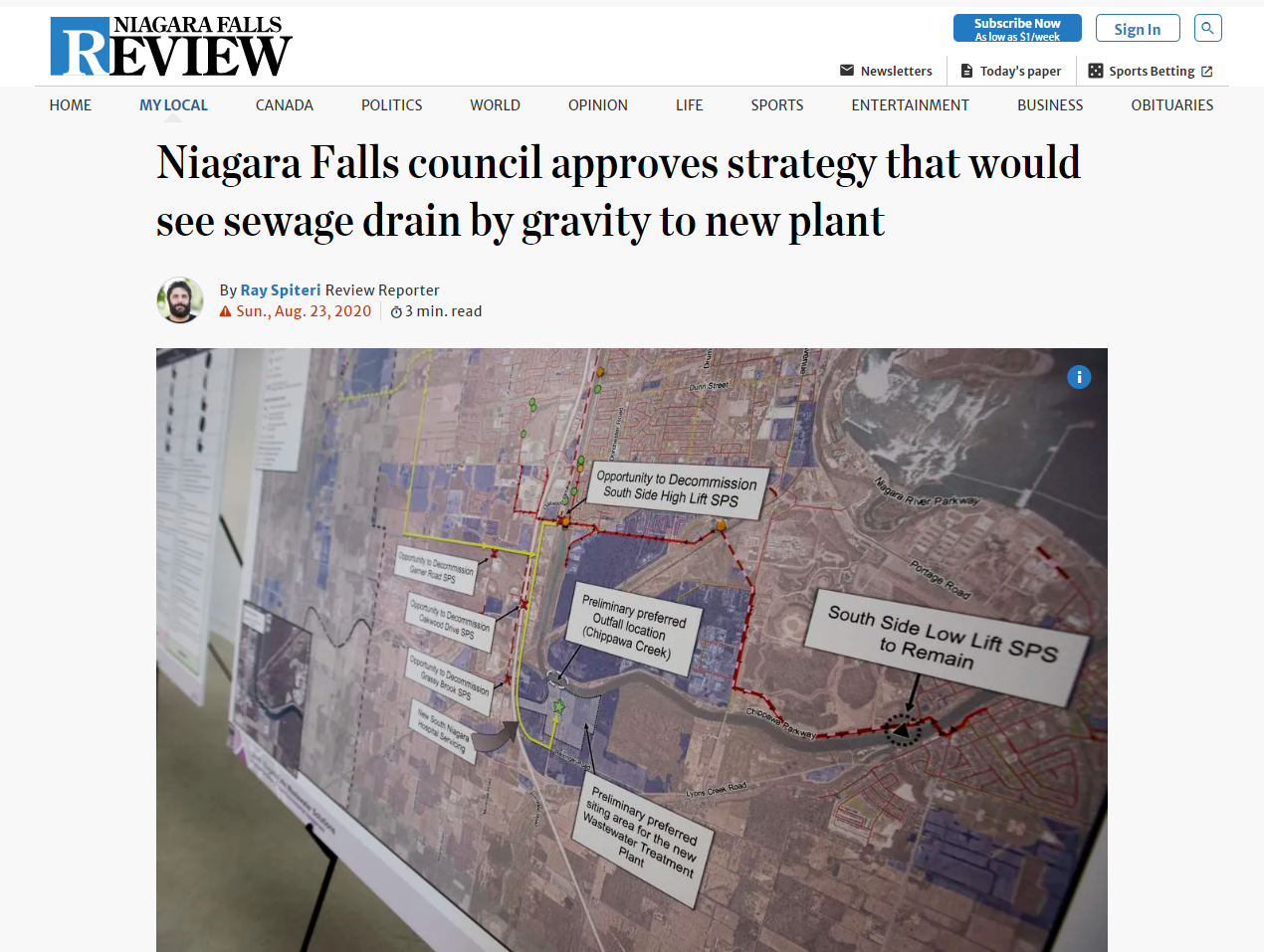Niagara Falls city council wants to see a change in the way sewage flows in Chippawa.
During a recent meeting, council directed staff to move forward with a Chippawa servicing strategy, specifically including gravity drainage to the future proposed wastewater treatment plant.
Coun. Victor Pietrangelo, who made the motion, said this would eliminate the pumping of sewage across the Welland River, known locally as Chippawa Creek or the Crick, including allowing for future servicing capabilities.
The resolution, which was approved unanimously, will be sent to Niagara Region for support and possible inclusion in its ongoing planning and development efforts.
“In my humble opinion, this will eliminate the focus from being on the existing infrastructure since sewage will, once implemented, be flowing via gravity,” said Pietrangelo.
Officials are looking at a 16-hectare greenfield north of Reixinger Road, south of Welland River and east of the QEW, for Niagara Region’s south Niagara Falls wastewater treatment plant.
The goal is to have the facility in service by 2027.
The project is expected to improve efficiency of the wastewater system in the south end of the city, which now pumps wastewater uphill to the other side of Lundy’s Lane where gravity takes over on the way to the existing Stanley Avenue treatment plant.
The Chippawa area has had a long history of issues pertaining to wastewater servicing.
The issues are more pronounced during wet-weather events as a result of significant extraneous flows entering the sewer system, resulting in sewer surcharging, overflows, and sometimes basement flooding.
City staff said more than $22.4 million has been committed or spent during the last 20 years through studies, capital infrastructure improvement projects and assistance programs to reduce the risk of basement flooding.
Erik Nickel, the city’s director of municipal works, said right now sewage in Chippawa is pumped across Welland River.
“There’s really only one treatment facility and that’s on Stanley Avenue in the north end,” he said.
“All of the sewage gets drained in Chippawa to pumps that pump it under the creek and then it has to continue to be pumped up over Lundy’s Lane, because that’s kind of the high point of the city, and then it can go by gravity all the way to the treatment facility on Stanley.”
Nickel said the new plant, which is in the early stages of approval, presents an option to avoid pumping everything across the river, “if we can extend a sewer from that new plant to Chippawa.”
“It’s a regional pump system, it’s a regional trunk sewer that would be providing the relief for that part of Chippawa,” he said.
“We are still continuing to work with the Region through some of those finer details. All signs point to there being no issues to drain that section of Chippawa by gravity on the south side on the Welland River.”
Pietrangelo said hearing it’s a “viable” option, “I personally would like to make it a priority of the city that we look at changing the flows that Chippawa currently has.”
“Once the new sewage treatment plant is open, we’ll have the infrastructure in place so that we no longer have to pump sewage underneath the creek,” he said.
“To me, that is part of the problem and I think any time that you’re not flowing by gravity, you’re just asking for things to go wrong.”
Mayor Jim Diodati said Pietrangelo’s idea is “brilliant” and is “the most efficient way to deal with sewage.”
“The way we do it now, it’s very inefficient,” he said.
“Everything in Chippawa and in south Niagara, we push uphill to Lundy’s Lane, so it’s going uphill for many kilometres and then it flows downhill towards the Stanley treatment centre. It goes underneath the Welland River and then uphill. It was not a great design from back in the day.”
Diodati said Pietrangelo has been pushing “very aggressively” for the new treatment plant.
“The idea now will take a lot less effort to treat a lot more sewage and it’s a great plan,” he said.
“Vic is absolutely right on with this and it’s going to help anybody with challenges with floods and sewer backups. This is going to be a long-term fix for well into the future.”




